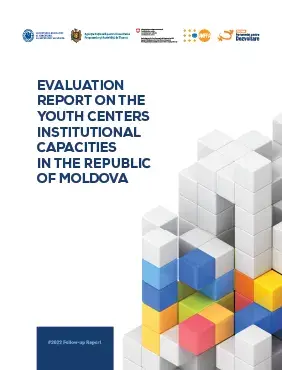Youth Centers are institutions that offer a wide range of services and programs, with equal access for every young person. These refer to information, guidance, counseling, education, empowerment, and organization of leisure activities for young people, with the aim of preparing them for the social and professional transition to adulthood. Currently, the Ministry of Education and Research (MER) supports the activity of 44 Youth Centers throughout the country (of which 26 are district/municipal centers, and the rest – their subsidiaries).
However, currently, the Youth Centers have a limited area of coverage of young people in the services. According to the available data, only half of the young people who need support manage to benefit from the services provided by these institutions. The gap between the levels of need and actual benefit of services can be determined by several structural factors: (i) access to these services (from the perspective of geographic location, physical accessibility, and hidden costs); (ii) the motivation and understanding of the importance of accessing youth services and (iii) the options of offered services to align with the real needs of young people. Considering that this gap is also persistent among young people who show increased civic activism, we can conclude that the motivation to benefit from the services of Youth Centers would have a lower weight as an influencing factor.
Although the regulatory framework provides for an extensive number of recommended services to be provided by Youth Centers, they are limited to only a few essential services of medium to minimal complexity. Thus, according to the Framework Regulation, in order to achieve the objectives and based on the identified interests of the young people in the community, YC can provide 9 types of services of various complexity. However, the reality shows that most young people access 3 types of services, most frequently offered by the Youth Centers, as follows: (i) leisure activities (ii) information and documentation, (iii) participation. More complex services, such as economic empowerment, vocational guidance, etc., are less common in the portfolio of most YCs. Most often, young men/women aged 15-19 from urban areas benefit from the Youth Centers' services. From the perspective of inclusion, integrating people with disabilities in YC activity is still an important challenge for youth specialists. However, the share of beneficiaries with disabilities increased from 0.5% of the total number of visitors at the beginning of the activity of the Youth Centers to 0,8% in 2022.
Regarding the level of institutional development, the Youth Centers have managed to advance slightly in recent years. The analysis of the level of institutional development of the Youth Centers, measured on a scale from 0 (lack of organizational capacity) to 4 (advanced organizational capacity), indicates an average of 2.05 in 2022, compared to 1.64 in 2018. Positive trends were recorded in each assessment area. At the same time, the most significant increases are seen in the institutional components: (i) Programs/services and activities – increased by 0.59 points, (ii) Planning, monitoring, evaluation, and reporting – evolved by 0.55 points, and (iii) Public image/ communication and partnerships – with 0.52 points increase. On the other hand, financial and human resources management remain underdeveloped and risk undermining progress in other organizational areas.
In recent years, most of the Youth Centers have managed to benefit from institutional support, which has determined a more balanced organizational development, compared to 2018. In 2018, there were 6 Youth Centers with a consolidated level of development and over 9 centers with an initial level of development. In the year 2022, there are 13 YCs with a consolidated and advanced level of development and only one with an early level of development. Therefore, we find that over 50% of the Youth Centers in Moldova have a higher-than-average level of institutional development.


